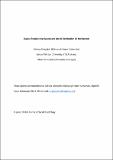Status, relative deprivation, and moral devaluation of immigrants
Abstract
Immigration has been a prominent political issue for decades, but particularly so with rising national populism. To understand current anti-immigration opinion, we turn to the concept of relative deprivation, which, we argue, is fundamentally about entitlement and is at the heart of popular backlash against immigration. Examining the United Kingdom context, we predicted that immigration attitudes would be contingent on immigrant group status, with immigrants from low-status or poorer countries (Poland, India) more likely to be perceived as encroaching on the majority group’s entitlements than those from high-status or richer countries (Germany, Australia). We further proposed moral devaluation (dehumanization and distrust) as a novel mechanism (over and above prejudice) underlying the conditional effects of relative deprivation on support for formal (anti-immigration policies) and informal (hate crime) means of immigrant exclusion. A pilot study (n = 245) and cross-sectional survey (n = 490) results supported our main prediction that status matters: participants felt more deprived relative to low- than high-status immigrants, and this predicted stronger support for anti-immigration policies both directly and through higher distrust (but not dehumanization). This research highlights the need to unpack the generic ‘immigrant’ category and study anti-immigration sentiment in terms of group status and moral devaluation.
Citation
Gheorghiu , M , Pehrson , S & Christ , O 2021 , ' Status, relative deprivation, and moral devaluation of immigrants ' , British Journal of Social Psychology , vol. Early View . https://doi.org/10.1111/bjso.12493
Publication
British Journal of Social Psychology
Status
Peer reviewed
ISSN
2044-8309Type
Journal article
Collections
Items in the St Andrews Research Repository are protected by copyright, with all rights reserved, unless otherwise indicated.

